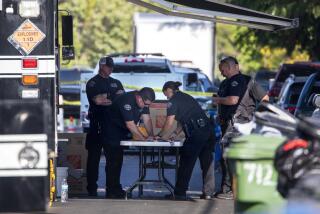With Thailand bombings on the rise, the GT200 detector is under scrutiny
- Share via
Reporting from Pattani, Thailand — More violence this week in Thailand’s restive southern provinces has intensified the controversy in the country over a bomb detector that critics call ineffective.
Seven soldiers were injured Tuesday in two bombings, one involving a unit protecting teachers, the other targeting a truck on patrol. These attacks followed a roadside bomb blast Monday that wounded two soldiers.
The attacks in a region with a long-running Muslim insurgency follow weeks of debate by government officials, human rights groups, army brass and scientific experts over the effectiveness of the British-made GT200 wand after a BBC expose last month found it wanting.
The controversy has left many Muslims in this hard-hit area wondering whether justice was miscarried -- the device’s findings have prompted hundreds of detentions over the last three years -- even as some Buddhists worry that the lack of a reliable detector could leave them vulnerable.
Thousands of people have been killed by bombs, shootings and knife attacks in recent years in three primarily Muslim provinces in the south that were once part of an autonomous Malay Muslim sultanate. In 1902, the area was annexed by majority Buddhist Thailand and tensions have continued since.
In its January report, the BBC found that some bomb-detection devices, including the GT200 made by Britain’s Global Technical Ltd., weren’t much more effective than guesswork. An explosives expert who disassembled the GT200 said it contained little more than an “empty plastic case” lined with a bit of cheap circuitry of the sort used by retailers to deter shoplifting.
After the report aired, Britain banned the export to Iraq and Afghanistan of the ADE651, a similar device that works on the same principle, which the U.S. military had already concluded was unreliable. British authorities arrested the president of that company, and the Iraqi government has launched its own investigation.
Even as foreign governments condemn such devices, the Thai military -- which spent more than $20 million on them and has deployed them widely in southern Thailand since 2007 -- defends their use. It has done so despite a Thai government test that found they failed 16 of 20 times.
“At this stage there is no banning order by the government, so the army will continue to use it,” army chief Gen. Anupong Paochinda told reporters last week.
Officials at Global Technical and its Asian suppliers could not be reached for comment. However, a statement on the company’s website said there were conflicting reports about the Thai tests, adding that previous tests and widespread use “confirms that the GT200 is effective and because of this, we would ask that you treat with caution any reports to the contrary.”
As the public outcry has intensified, Prime Minister Abhisit Vejjajiva has told those military units that choose to continue using the scanner that they do so “at their own risk.”
Opposition politicians have called on a national anti-corruption commission to investigate the army’s purchase, given suspicion that higher-than-market prices were paid. The Thai civic organization Working Group on Justice for Peace said the GT200 purchase was made through a “secret” military budget that bypassed parliamentary oversight.
Other critics have compared the device’s effectiveness to a Ouija board and said its use endangers soldiers and the public.
“It is similar to a wood stick that people used to detect dead bodies buried in a cemetery,” said Jetsada Denduangboripan, a science lecturer at Bangkok’s Chulalongkorn University, during a parliamentary inquiry.
In one case cited by the Thai civic group, three border police officers were killed in November 2008 when a bomb exploded after a GT200 hadn’t detected it.
Another concern is that continued use of the device risks further injustice in a part of the country that is already deeply suspicious of government rule.
Kraisak Choonhavan, a deputy opposition leader and member of parliament, said about 500 people have been arrested or detained based on evidence linked to the GT200.
For many Muslims in southern Thailand, the device has become a symbol of injustice, said Srisompob Jitpiromsri, associate professor at Pattani’s Prince of Songkhla University.
“People are sent to jail because of these tools,” he said. “And while most of them are eventually released by the courts for lack of evidence, it can take one or two years, all without compensation.”
But other residents said they want bomb detectors to provide peace of mind.
“Imagine how I feel as a local that the GT200 is not working and there’s nothing to replace it,” said a Buddhist community leader who requested anonymity, concerned that his comments might damage his ties with the army. “There’s nothing to replace it. This makes me feel very unsafe.”
Although human rights groups have criticized the use of the device, a senior military commander, who requested anonymity given the debate’s political nature, said the GT200 findings are used as only part of a bigger pattern of evidence.
“Now with all these questions about effectiveness, though, we’ll have to be even more careful in making arrests,” he added.
mark.magnier @latimes.com
More to Read
Sign up for Essential California
The most important California stories and recommendations in your inbox every morning.
You may occasionally receive promotional content from the Los Angeles Times.













